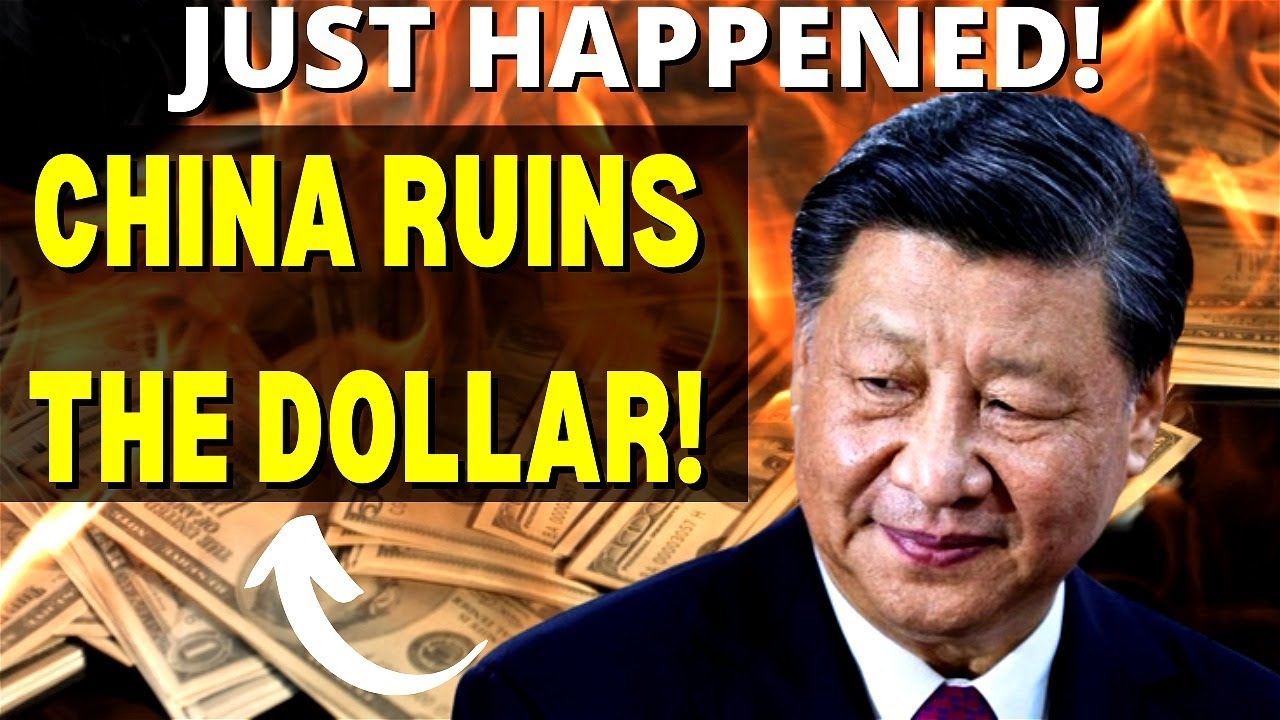
China JUST ANNOUNCED Massive US Dollar DUMP | HUGE THREAT To The US Economy
Keep up to Date & Bypass the Big Tech Censorship
Get uncensored news and updates, subscribe to our daily FREE newsletter!
For many years now, the US dollar has been the world’s dominant reserve currency. This means that many countries around the world hold large amounts of US dollars as a way of conducting international trade and financing.
China has been one of the largest holders, with its foreign exchange reserves totaling over 3 trillion dollars at one point. However, in recent years, China has been taking steps to reduce its dollar reserves.
Are you curious about China’s recent selling of US Treasuries and how it could impact the US and the entire global financial system?
| Recommended Books [ see all ] | ||||
|---|---|---|---|---|
 |  |  |  |
 |
If You Like This Video; Like, Share, Comment And Subscribe. This Means A Lot To Us!
Thanks For watching Our Video; China JUST ANNOUNCED Massive US Dollar DUMP | HUGE THREAT To The US Economy
China’s holdings of US Treasuries have dropped to their lowest level in 12 years. It appears to be part of a strategic move to challenge the dominance of the US dollar in the world economy
As tensions between the United States and China rise, China is intentionally lowering its holdings of government bonds in order to fight “dollar hegemony.” There are several other factors contributing to China’s decision to decrease its dollar reserves.
First, there are growing geopolitical tensions between the United States and China, which have been worsened by the trade war and other issues. China is also concerned that the US could use its control of the dollar as a weapon in these disputes, by freezing Chinese assets or limiting its access to the global financial system.
Another reason is its concern about the long-term viability of US fiscal and monetary policy, especially with regards to the country’s growing debt levels. The country is worried that the US could face a debt crisis in the future, which could lead to inflation or a sharp drop in the value of the US dollar.
Finally, China is trying to internationalize its own currency, the renminbi, and reduce its dependence on the US dollar. It sees the renminbi as a potential rival to the US dollar as a global reserve currency, and wants to increase the use of the renminbi in international trade and finance.
China’s holdings of US Treasury bonds at lowest level in 12 year. According to the Center for International Finance, China’s ownership of US Treasury bonds has hit a record low since 2010.
As of February, China’s US Treasury bond balance was $848.8 billion, down from $1.403 trillion in December 2021. The decline started in 2017 during the US-China trade war, and the trend has accelerated in recent years, with China’s US Treasury holdings falling by 17.5% in February 2022 compared to the previous year.
And so to protect their currencies from the strong US dollar caused by the “US Federal Reserve System’s” tight policies; major countries like China, Japan, and Korea sold US Treasury bonds.
This trend continued last year, leading to a “reverse exchange rate war.” Recent reports show that the need for central banks to intervene in the foreign exchange market has decreased as the US dollar’s strength has eased this year.
This is due to the expectation that the Federal Reserve System’s interest rate hike will soon come to an end. As a result, the balance of US Treasury holdings in major countries has returned to an upward trend since November last year.
The Treasury International Capital has reported an increase in the balance of US Treasury holdings in 38 countries worldwide. The balance rose from $7.1332 trillion in October last year to $7.3436 trillion in February, indicating an overall upward trend.
However, China is taking a different path from other major economies. The Chinese government is reducing its holdings in US dollar assets and government bonds, aiming to diversify its portfolio and internationalize the renminbi.
This stance has become more prominent as the global economic bloc accelerates, leading to supply chain reorganization around allies in the wake of the Russia-Ukraine war last year.
As the US dollar remains strong, the effect of this trend on global markets in the future remains to be seen. Recently, the United States imposed sanctions against China, particularly in the area of semiconductors, while also strengthening cooperation with its allies.
In response, China is believed to be selling US Treasury bonds, according to experts. The Chinese state-run media outlet, the Global Times, stated that “China is reducing its holdings of US Treasuries to strengthen its long-term economic and financial security.
The People’s Bank of China, the country’s central bank, has also reduced the weighting of the US dollar in its foreign exchange reserves and advocated for greater diversification.


